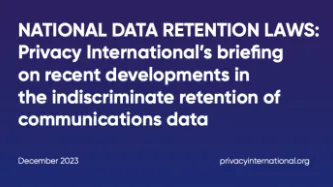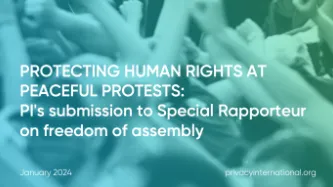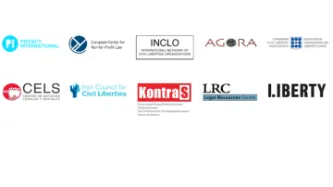Search
Content type: Long Read
1. What is the issue?Governments and international organisations are developing and accessing databases to pursue a range of vague and ever-expanding aims, from countering terrorism and investigating crimes to border management and migration control.These databases hold personal, including biometric, data of millions if not billions of people, and such data is processed by technologies, including Artificial Intelligence (AI), to surveil, profile, predict future behaviour, and ultimately make…
Content type: Long Read
Our briefing, “When Spiders Share Webs: The creeping expansion of INTERPOL’s interoperable policing and biometrics entrench externalised EU borders in West Africa”, explores the concerning human rights implications of the use of interoperable data-driven policing capabilities and biometric technologies in West African countries rolled out by the International Criminal Police Organisation (INTERPOL)’s European Union (EU)-funded West African Police Information System (WAPIS) programme. We make a…
Content type: Long Read
The fourth edition of PI’s Guide to International Law and Surveillance provides the most hard-hitting past and recent results on international human rights law that reinforce the core human rights principles and standards on surveillance. We hope that it will continue helping researchers, activists, journalists, policymakers, and anyone else working on these issues.The new edition includes, among others, entries on (extra)territorial jurisdiction in surveillance, surveillance of public…
Content type: Report
First published in 2017, PI’s Guide to International Law and Surveillance is an attempt to collate relevant excerpts from these judgments and reports into a single principled guide that will be regularly updated. This is the fourth edition of the Guide. It has been updated it to reflect the most relevant legal developments until March 2024.The Guide aspires to be a handy reference tool for anyone engaging in campaigning, advocacy, and scholarly research, on these issues. The fourth…
Content type: Long Read
Sports are a huge part of daily life for billions around the world, a fundamental aspect of the rich tapestry of the human experience.Attending a major sporting event can be a formative experience in someone’s life, as a place to share in a communal culture.Increasingly we have seen surveillance, and especially mass surveillance measures, being introduced at sports events impeding the enjoyment particularly of the right to privacy and right to participate in sporting life.When we saw that the…
Content type: Report
Over the past years, data retention regulation imposing generalised and indiscriminate data retention obligations to telecommunication companies and Internet service provides has been introduced in various jurisdictions across the world. As the data retention practices across the world have evolved this new report is an attempt to shed some light on the current state of affairs in data retention regulation across ten key jurisdictions. Privacy International has consulted with human…
Content type: Advocacy
Privacy International had suggested the Human Rights Committee consider the following recommendations for the UK government:Review and reform the IPA 2016 to ensure its compliance with Article 17 of the ICCPR, including by removing the powers of bulk surveillance;Abandon efforts to undermine the limited safeguards of the IPA 2016 through the proposed Investigatory Powers Amendment Bill;Refrain from taking any measures that undermine or limit the availability of encrypted communications or other…
Content type: Advocacy
BackgroundThe Snowden revelations and subsequent litigation have repeatedly identified unlawful state surveillance by UK agencies. In response, the UK Parliament passed the highly controversial Investigatory Powers Act 2016 (IPA), which authorised massive, suspicionless surveillance on a scale never seen before, with insufficient safeguards or independent oversight.Privacy International led legal challenges to this mass surveillance regime both before and after the Act became law. The Act…
Content type: Advocacy
Privacy International (PI), Big Brother Watch (BBW), StopWatch, CopWatch, Defend Digital Me, Liberty and Statewatch have written to Home Secretary James Cleverly to raise concerns over the danger posed to UK society by Facial Recognition Technology (FRT).In a letter sent on 18 January 2024, the signatories raised concerns over the escalating use of FRT and warned the Home Secretary that "The indiscriminate use of this dystopian biometric technology to identify people in public spaces is a form…
Content type: Advocacy
Privacy International's response to the call of submissions of the UN Special Rapporteur on the rights to freedom of peaceful assembly and of association on the tools and guidelines which may assist law enforcement in promoting and protecting human rights in the context of peaceful protests. The Special Rapporteur's report will be presented at the 55th session of the UN Human Rights Council.While PI recognises the role of law enforcement can play in facilitating the enjoyment of freedom of…
Content type: Advocacy
Privacy International joined civil society efforts to call the South African Parliament not to approve the draft General Intelligence Laws Amendment Bill 2023 (GILAB), which was approved by the Cabinet and introduced in Parliament.
The Bill was proposed by the South African government, after the Constitutional Court found the Regulation of Interception of Communications Act of 2002 (RICA) unconstitutional on multiple grounds.
The draft Bill fails to meet the human rights standards on many…
Content type: Long Read
TAKE ACTION TO STOP THE END OF PRIVACY IN PUBLIC1. IntroductionThe use of facial recognition technology (FRT) by law enforcement and private companies in public spaces throughout the UK is on the rise. In August 2023, the government announced that it is looking to expand its use of FRT, which it considers “an increasingly important capability for law enforcement and the Home Office”. The indiscriminate use of this dystopian biometric technology to identify individuals in public spaces is a form…
Content type: Advocacy
Dejusticia, Fundación Karisma, and Privacy International submitted a joint stakeholder report on Colombia to the 44th session of the Universal Periodic Review at the UN Human Rights Council.Our submission raised concerns regarding the protection of the rights to freedom of expression and opinion, to privacy, and to personal data protection; the shutdown of civil society spaces; protection of the right to protest; and protection of the rights of the Venezuelan migrant and refugee population.…
Content type: Advocacy
On 6th October 2023, we submitted our comments on the Regulation of Interception of Communications and Provision of Communication-related Information Amendment Bill (the Rica Bill), published in Government Gazette 49189, August 25th, 2023, in response to a call for comments issued by the Portfolio Committee on Justice and Correctional Services – a committee of the Parliament of South Africa responsible for overseeing responsible the Department of Justice and Constitutional Development.
In our…
Content type: Advocacy
On the 17 January 2023, the UK Home Secretary appointed Lord David Anderson KBE KC to carry out an independent review of the Investigatory Powers Act 2016.The Investigatory Powers Act 2016 provides a legal framework for the use of investigatory powers by the UK security and intelligence agencies, law enforcement and other relevant public bodies. These powers include the interception of communications; the retention and acquisition of communications data and; equipment interference for obtaining…
Content type: Advocacy
Privacy International (PI), the European Center for Not-for-Profit Law (ECNL), International Network of Civil Liberties Organizations (INCLO), Agora, the Canadian Civil Liberties Association, Centro de Estudios Legales y Sociales in Argentina, the Irish Council for Civil Liberties, KontraS in Indonesia, the Legal Resources Center in South Africa, and Liberty in the UK welcome the opportunity to provide input to the global study of the UN Special Rapporteur on the promotion and protection of…
Content type: Report
PI has been fighting against police using intrusive & disproportionate surveillance technologies at protests around the world for years. Unregulated surveillance and indiscriminate intrusions on our privacy have a chilling effect on the right to freedom of assembly.
We've fought to uncover the types of technologies that police secretly deploy at protests, and we have detailed how protesters around the world can try to protect their intimate and sensitive data from being captured by the…
Content type: Long Read
We won our case against the UK’s Security Service (MI5) and the Secretary of State for the Home Department (SSHD). The Investigatory Powers Tribunal (IPT) – the judicial body responsible for monitoring UK’s intelligence and security agencies – held that MI5 acted unlawfully by knowingly holding people’s personal data in systems that were in breach of core legal requirements. MI5 unlawfully retained huge amounts of personal data between 2014 and 2019. During that period, and as a result of these…
Content type: Report
End-to-end encryption (E2EE) contributes significantly to security and privacy. For that reason, PI has long been in favour of the deployment of robust E2EE.Encryption is a way of securing digital communications using mathematical algorithms that protect the content of a communication while in transmission or storage. It has become essential to our modern digital communications, from personal emails to bank transactions. End-to-end encryption is a form of encryption that is even more private.…
Content type: Advocacy
Despite repeated recommendations by the UN Human Rights Council and the UN General Assembly to review, amend or enact national laws to ensure respect and protection of the right to privacy, national laws are often inadequate and do not regulate, limit or prohibit surveillance powers of government agencies as well as data exploitative practices of companies.
Even when laws are in place, they are seldom enforced. In fact PI notes how it is often only following legal challenges in national or…
Content type: News & Analysis
The UK government has acknowledged that section 8(4) of the Regulation of Investigatory Powers Act (“RIPA”) (which has since been repealed) violated Articles 8 and 10 of the European Convention on Human Rights (ECHR). In relation to Article 10, it specifically acknowledged that the way in which security agencies handled confidential journalistic material violated fundamental rights protected by Article 10.
As part of a friendly settlement with two applicants, the UK government acknowledged…
Content type: News & Analysis
In the midst of the atrocious war currently being waged by Russia on Ukraine, on 14 March 2022 Reuters reported that Clearview AI, the infamous online surveillance company, had offered its services to the Ukrainian defense ministry. A day later in an interview for TechCrunch, Ukraine's vice prime minister and minister for Digital Transformation confirmed that the partnership with Clearview AI was "currently in very early development".
Clearview is an online surveillance company that collects…
Content type: Explainer
Following sustained reporting by researchers, journalists and activists around the world, including recent disclosures exposed by the PegasusProject, the surveillance industry is facing scrutiny like never before.
In the latest move, eighteen U.S. lawmakers have today demanded that the U.S. government imposes sanctions on four non-US surveillance companies for, as they mention in their letter, facilitating “disappearance, torture and murder of human rights activists and journalists”.
The move…
Content type: Long Read
Zimbabwe has a history of state led surveillance that is carried out more for political gain than for the investigation of legitimate criminal activities. During former President Mugabe’s 37 year rule the government used laws and state security structures to carry out targeted surveillance of persons of political interest and more generalised mass surveillance of the population.
Specific laws such as the Interception of Communications Act as well as mandatory SIM-card registration regulations…
Content type: Examples
The 20 years since the 9/11 attacks have fundamentally changed the way the New York Police Department operates, leading it to use facial recognition software, licence plate readers, and mobile X-ray vans, among other surveillance tools for both detecting and blocking potential terrorist attacks and solving minor crimes. Surveillance drones monitor mass protests, antiterrorism officers interrogate protesters, and the NYPD’s Intelligence Division uses antiterror tactics against gang violence and…
Content type: Examples
The Myanmar military are stopping people in the street, checking through the data on their phones, and taking them to jail if they find suspicious messages or photos. At least 5,100 people were still in jail many months after opposing the February 1, 2021 military takeover. The spontaneous searches also deter individuals from continuing to post on social media or lead them to create new accounts they hope will evade detection, and avoid crowded streets where police or soldiers are likely to be…
Content type: News & Analysis
Introduction
The European Parliament has adopted a nonbinding resolution against the use of artificial intelligence (AI) by law enforcement in public spaces and a ban on facial recognition databases, such as the ones used by Clearview AI.
It is a significant and hugely welcome step in an ongoing campaign to ensure the EU leads the world in protecting against dangerous applications of AI within its borders.
The Resolution recognises the need to safeguard against application of AI and mass…
Content type: News & Analysis
After almost 20 years of presence of the Allied Forces in Afghanistan, the United States and the Taliban signed an agreement in February 2020 on the withdrawal of international forces from Afghanistan by May 2021. A few weeks before the final US troops were due to leave Afghanistan, the Taliban had already taken control of various main cities. They took over the capital, Kabul, on 15 August 2021, and on the same day the President of Afghanistan left the country.
As seen before with regime…
Content type: News & Analysis
As Amnesty International and Forbidden Stories continue to publish crucial information about the potential targets of NSO Group’s spyware, we know this much already: something needs to be done.
But what exactly needs to be done is less obvious. Even though this is not the first time that the world has learned about major abuses by the surveillance industry (indeed, it’s not even the first time this month), it’s difficult to know what needs to change.
So how can the proliferation and use of…


























